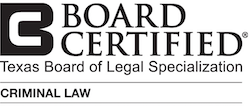Possible DWI Defenses
Usually the ultimate goal for any individual accused of a DWI charge has one goal in mind. They want to obtain a "Not Guilty" verdict, have the charge dismissed, retain their driving privileges (and if possible, minimize any possible license suspensions that may result from the arrest). The following are some possible defenses that can be used to fight and contest a charge of Driving While Intoxicated in Texas. Some possible defenses, however, particularly in cases involving a chemical test (either breath or blood), can possibly be best assisted if the individual accused is able to retain an expert witness to testify at trial (obviously only in the case where the situation permits).
1. ATTACKING THE TRAFFIC STOP
The police must have "reasonable suspicion" to initiate a traffic stop. If they do not have the requisite reasonable suspicion for the traffic stop, then a motion to suppress could be conducted. If this motion is granted, all evidence subsequent to the stop would be suppressed and not admissible at a trial. If this happens, the case would effectively be dismissed. Theoretically, if the prosecutor still chose to proceed forward, there would be no evidence to be used at trial, which would result in a "Not Guilty."
2. NOT THE DRIVER OF THE VEHICLE
The state must prove beyond a reasonable doubt that you attempted to drive, or were the driver, of a motor vehicle. They must be able to show that you were actually the one behind the wheel and driving. There are times when the driver may have already exited the vehicle by the time the investigating officer arrived at the scene. If the state cannot "wheel" the defendant as the driver of the vehicle, it would result in a "Not Guilty" verdict, either by the judge or the jury.
3. BAC (BLOOD ALCOHOL CONTENT) LEVEL UNDER A .08 AT THE TIME OF DRIVING
The state must be able to provide evidence Beyond a Reasonable Doubt that the BAC of the individual at the time of driving the vehicle was over a .08. A driver who was not actually found in the vehicle when police made contact could possibly raise doubt by asserting any alcohol consumed may have been done after the vehicle was driven. In addition, another situation may be where the driver consumed alcohol immediately prior to operating the vehicle. If this happens, then the alcohol may not have been fully absorbed into the bloodstream while the vehicle was being driven. If a chemical test is later obtained and it is at (or around) the .08 BAC level, then the driver may have been under a .08 at the time the motor vehicle was being operated (which is what State law requires).
4. INACCURATE BREATH TEST
The Intoxilyzer 5000 (the evidentiary breath test machine currently used in Texas) makes certain assumptions when a result is obtained. There are numerous defenses that could be raised related to the inaccuracy of the breath test machine. The most common example would be how the Intoxilyzer 5000 assumes a particular "partition ratio" that varies from one individual to another. The partition ratio of the Intoxilyzer 5000 makes a general assumption of 2100:1 converting BrAC (Breath Alcohol Concentration to BAC (Blood alcohol concentration). Thus, if the individual had a lower partition ratio than this 2100:1 ratio, the breath test result obtained would produce an error by the difference between the two ratios.
Another example of possible breath test machine error would be related to mouth alcohol. Often, the breath test machine will detect mouth alcohol (which is not alcohol that would relate to intoxication) instead of the alcohol coming from the alveolar/lung air. To attempt to offset this possible error, the breath test operator is required to wait at least 15 minutes (this time period differs in various states) to try to ensure that nothing is put into the mouth before the test, and also that no burping, belching, or vomiting occurs. Portable breath tests are especially susceptible to this problem. If an individual has dentures, this could also lead to the breath test machine falsely reading alcohol that is pooled in the mouth. If an individual either regurgitates or burps/belches before the sample is obtained, even if only in a small amount, this would affect the accuracy of the sample obtained. Often, the regurgitation or the burp/belch is so small, the police officer administering the sample does not know it occurs. If this occurs, it would lead to mouth alcohol being misread, which would lead to an abnormally high breath sample.
The machine must also be calibrated at certain intervals in Texas by a Technical Supervisor, which may not always occur. Thus, even if the machine was working when it last checked, this would not necessarily mean that it was working properly when it was used.
Problems also occur in the actual administration of the breath test. The person who administers the test should be a certified "Breath Test Operator." Often, this "BTO" may not follow proper regulations when the test is administered. Two common examples would be not following the "15-minute waiting period" described above, or the officer not taking into account things like "Radio Frequency Interference." Radio frequencies can interfere with the Intoxilyzer 5000, in the same way that electronic devices can interfere with an airplane (why you are required to turn off all electronic devices during flight take off). Usually this would occur if the "BTO" (or other officers in the room) forget to deactivate or turn off their walkie-talkies.
Certain medical conditions can also affect the accuracy of the Intoxilyzer 5000. If a particular individual has diminished lung capacity, and cannot blow hard enough to give a reading, it would prevent them from being able to provide a breath sample. If this occurs, usually the BTO will deem the lack of being able to obtain a sample as a refusal, which would in effect, be used against you. As well, if an individual has a medical condition, such as gastro-esophageal reflux disease (GERD), it could affect the integrity of the breath sample obtained. GERD is analogous to an individual having severe heart burn and/or acid reflux. If an individual suffers from GERD, the Intoxilyzer 5000 might read alcohol that is coming from the stomach air because the esophagus would not be preventing any regurgitation, as opposed to alcohol from the alveolar/lung air. The Intoxilyzer 5000 is ONLY supposed to take into account alcohol read from the alveolar/lung air, and not any alcohol molecules that are coming from the stomas. Thus, the sample obtained from an individual with GERD could be substantially inaccurate. Other information related to Intoxilyzer 5000 can be found here.
5. INACCURATE BLOOD TEST
There are also many possible problems associated when a blood test is obtained. Often the investigating officer may not be aware that he is using an expired blood test kit, which could lead to an inaccurate test sample. Also, if the phlebotomist (the person who draws the blood) uses an alcohol swab (as opposed to betadyne) it would lead to sample that is grossly inaccurate. As well, problems could arise if the phlebotomist does not put the blood into a tube utilizing the proper amount of anti-coagulant and/or preservative (to prevent the blood sample from clotting). The officer or the state lab also may not improperly store the blood before the sample is actually tested. Storage at low temperatures, and not utilizing the proper amount of anti-coagulant and/or preservative may lead to fermentation. If fermentation occurs, the alcohol in the blood sample while stored would contaminate the result when tested, leading to a false-positive result. The state must also be able to prove the proper chain of custody showing the blood drawn and analyzed was actually your blood sample. If they cannot, then it would impossible to determine which blood sample was actually tested.
6. FIELD SOBRIETY TESTS
Some of the strongest evidence the investigating officer uses to try and determine the level of intoxication is requesting that the driver perform the "Standardized Field Sobriety Tests." If these "SFST's" are not properly administered, the NHTSA manual (National Highway Traffic Safety Administration) clearly indicates that THE RESULTS ARE COMPROMISED. NHTSA is the authoritative body which governs how these tests should be administered by police officers investigating individuals under suspicion of DWI. Often they deviate from what is required, which would lead to results that are not accurate. However, even if the tests are administered in the proper fashion, NHTSA clearly indicates that many types of factors may render an individual not a candidate for the SFST's. Factors such as age, weight, improper footwear, and certain medical conditions that may affect physical performance, such back or leg problems, may affect the validity of the test.
7. NOT DRIVING IN A PUBLIC PLACE
The state must be able to prove that an individual was operating a motor vehicle in a "public place." A "public place" is defined in Section 1.07(40) of the Texas Penal Code as "any place to which the public or a substantial group of the public has access and includes, but is not limited to, streets, highways, and the common areas of schools, hospitals, apartment houses, office buildings, transport facilities, and shops." Thus, you are technically "Not Guilty" of Driving While Intoxicated if you are operating a motor vehicle on private property, such as your own lawn or another piece of private property.
No matter what the charge consists of, or what the nature or circumstance is, for your particular Driving While Intoxicated case, Carl and his legal team can help mount the best defense possible in the event you wish to contest your charge. The Law Offices of Carl David Ceder has successfully defended DWI cases all over the State of Texas, including those including chemical specimens of both Breath and Blood Tests. Carl has personally conducted DWI jury trials in over 10 different counties in the State of Texas. Carl and his legal team will help protect your criminal record and your license to drive. Please call 214.702.CARL(2275) or 469.2000.DWI(394) to obtain further information. Phones should be answered 24 hours a day/7 days a week for immediate and personal assistance.




















